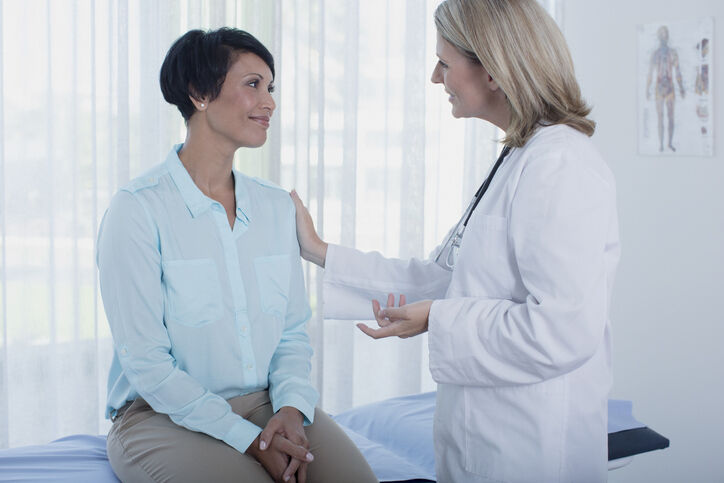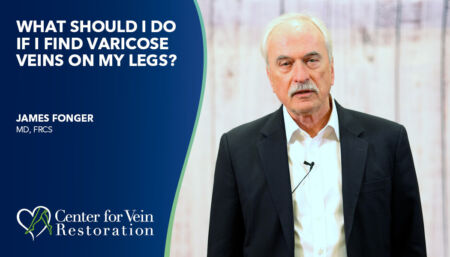
What to do When You First Notice Varicose Vein Symptoms
Are you noticing the first signs of varicose veins? Don’t delay treatment!

Medically reviewed by James Fonger, MD, FRCS, on May 13, 2023
Center for Vein Restoration (CVR) physician James Fonger, MD, FRCS, describes the many concerns people have about problem leg veins and has advice for those struggling with what to do about their bulging leg veins.
Varicose veins are a common medical condition affecting an estimated 20 percent of the adult population, according to the National Institutes of Health (NIH). While often assumed to be an “older person” condition, varicose veins also affect young people. Women are four times more likely than men to develop these enlarged, twisted, and swollen veins due to female hormones and pregnancy.
Caused by weakened valves in the leg veins, blood flows downward and pools in the lower leg, leading to leg swelling and bulging veins.
If you notice varicose veins on your legs, don’t panic. Instead, seek medical attention from a board-certified vein doctor. Unlike the more invasive treatment options available only a decade ago, modern vein treatment is minimally invasive, takes an hour or less to complete, and is performed as an outpatient. After varicose vein surgery, patients can immediately return to their normal routine with few restrictions.
While varicose veins are usually not a serious medical condition, the condition can cause throbbing, itching, cramping, pain, and health complications, including ulcers, bleeding, and blood clots, if left untreated.
Let vein expert, Dr. James Fonger, lead physician in Center for Vein Restoration’s Lawrenceville, Georgia clinic location, explain to you why vein treatment is necessary and how waiting can be risky:
“What people (with varicose veins) don’t realize is that if they accidentally bump their leg, that vein can thrombose or clot, and then it becomes exquisitely tender for a week or two, even though you’re taking anti-inflammatory and pain medications.”
– Dr. James Fonger, CVR lead vein physician, Lawrenceville, GA
There’s no need to guess about vein health, and there’s absolutely no need to suffer from varicose veins! Seek a qualified vein doctor to examine your legs and perform a diagnostic ultrasound to diagnose the severity of your condition. Depending on the extent of your venous insufficiency, your doctor may recommend lifestyle changes or one of many minimally invasive treatments available today at CVR.
Exercise can help reduce the symptoms of varicose veins. Walking activates the calf muscles that serve as a pump, improving blood flow in your legs and helping prevent blood from pooling. Exercise also helps maintain a healthy weight, which reduces the pressure on your legs.
Compression stockings can help improve blood flow and reduce the symptoms of varicose veins. These stockings put pressure on the legs and promote blood flow toward the heart. They are available in different styles and compression levels, depending on the severity of your condition.
Twisted, dilated, swollen leg veins happen when the one-way valves in the veins become weak or damaged, causing blood to pool in the veins and increasing pressure in your legs. Elevating the legs above the level of the heart can reduce pressure on the veins, making it easier for blood to flow toward the heart. As a result, symptoms such as pain, swelling, and feelings of heaviness dissipate. Additionally, elevating the legs can also help to prevent the formation of new varicose veins.
You need to think about varicose veins like the bulge in a tire. It’s a signal that the pressure has been too high in your leg for a period of time, not just a few months, but probably a few years. It’s a signal that something is going on inside you that needs to be taken care of.
– Dr. James Fonger, CVR lead vein physician, Lawrenceville, GA
Prolonged sitting or standing can worsen varicose veins. Being mindful of the time spent sitting or standing (and changing it up frequently!) will help promote blood flow and reduce the pressure on your legs. If you have a job requiring you to sit or stand for long hours, prioritize frequent breaks and put your feet up or move around if you sit a lot.
Excess weight can put pressure on your legs and worsen the symptoms of varicose veins. Maintaining a healthy weight through a balanced diet and regular exercise can help reduce the pressure on your legs and prevent the condition from worsening.
Since 2007, Center for Vein Restoration has been a trailblazer in the treatment of venous insufficiency (vein disease). In addition to offering patients a customized approach to treating varicose veins, spider veins, and other symptoms of vein disease (earning a 98 percent patient satisfaction rating!), CVR leads the way in research and physician training.
In 2017, Center for Vein Restoration was granted a Venous and Lymphatic Medicine fellowship by the American Board of Venous and Lymphatic Medicine (ABVLM). This fellowship is a 12-month program designed to provide broad training in diagnosing and managing patients suffering from chronic venous disorders.
Trust your leg health and well-being to only the best! Call 240-965-3915 to talk with a friendly Patient Services Representative (nosotros hablamos español), or schedule online HERE.
Most insurances cover vein treatment at Center for Vein Restoration, including Medicare and Medicaid.